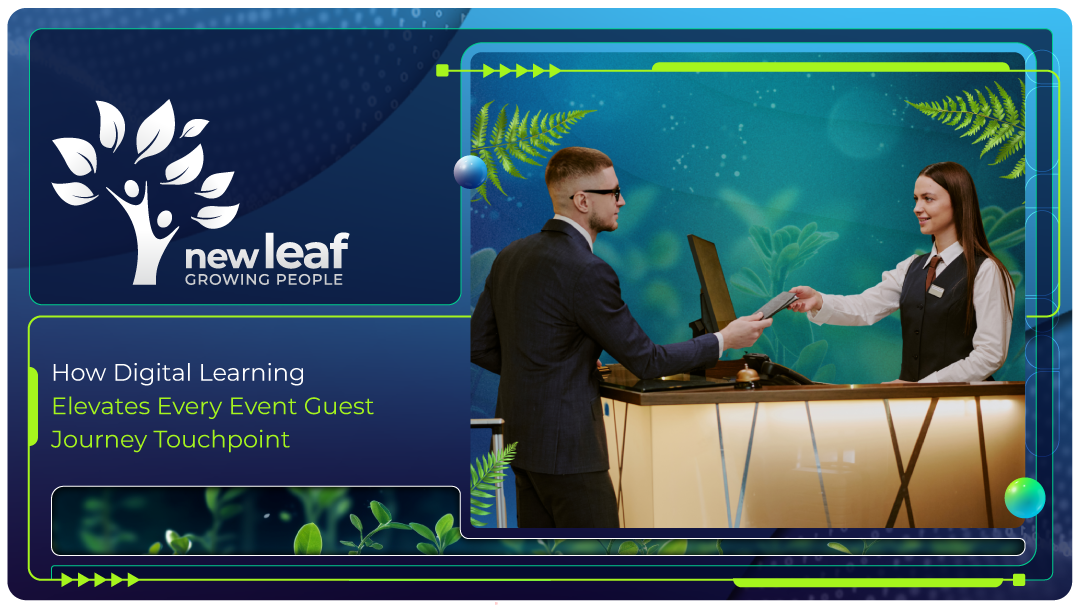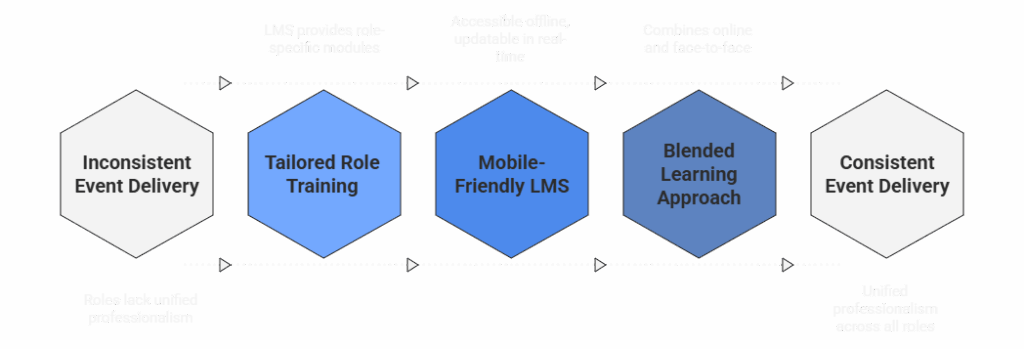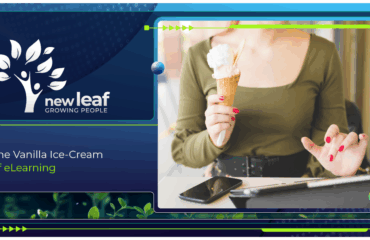
The First Impression, Last Impression Framework
In hospitality and events, the smallest detail shapes the biggest memories. A warm welcome, a timely drink refill, or a graceful recovery after a mishap are the moments that define the first and last impressions guests take away.
Yet in fast-paced event environments with shifting teams and tight deadlines, delivering seamless excellence across every touchpoint can feel impossible. That’s where digital event staff training transforms chaos into choreography.
Key Takeaways
- Every guest interaction, from first click to final farewell, influences brand perception.
- Inconsistent service across event teams damages trust, even when most moments go right.
- Digital event staff training builds consistent, confident performance across permanent, temporary, and vendor staff.
- Scenario-based microlearning equips teams to anticipate guest needs and recover gracefully when things go wrong.
- When training is continuous and tech-enabled, every event becomes a masterclass in memorable experiences.
Mapping the Complete Guest Journey
Every event guest passes through a sequence of touchpoints: anticipation, arrival, engagement, and reflection. Each moment carries emotional weight. A slow check-in, confusing signage, or inattentive service can overshadow months of planning.
For multi-location event businesses or catering operations serving diverse venues, this consistency challenge multiplies exponentially. Varying venue conditions and rotating staff create a perfect storm of conditions that can lead to service fragmentation.
eLearning for event staff training helps teams understand the guest journey holistically. Interactive modules can simulate real-world scenarios, from learning how to greet a VIP guest to communicating with suppliers. This way, every team member understands not only their own role but how it connects to the bigger picture.
When your training is aligned across departments, such as catering, logistics, communications, and front-of-house, your brand instantly projects reliability and care. Consistency turns one-time guests into loyal advocates.
The Scale Challenge: Managing Mixed Teams Under Pressure
Events work fundamentally differently from traditional hospitality operations. A restaurant has a stable team that works together daily, building implicit coordination and shared standards. Events, on the other hand, regularly deploy temporary teams comprising permanent staff, seasonal workers, and third-party vendors who may never have worked together before.
Consider a 500-person corporate gala. You might have 10 permanent coordinators, 40 seasonal servers, 15 contracted AV technicians, and eight vendor representatives from different catering partners. They have maybe only one pre-event briefing to align on standards, logistics, and brand expectations. Some are veterans with years of experience; others are working their first event.
Traditional training approaches fail in this context, because:
- Classroom sessions can’t accommodate constantly rotating staff.
- Shadowing programs don’t scale effectively.
- Printed manuals can easily be lost or ignored.
- Managers become bottlenecks, fielding endless questions that prevent them from focusing on guest experience training.
The staffing reality gets worse, as the US Bureau of Labor Statistics states that the hospitality sector faces a 70-80% annual turnover. This means event businesses are constantly onboarding new team members who must deliver excellence immediately, with no grace period for learning curves.
How Digital Learning Creates Consistency Across Roles
Event delivery depends on teamwork between specialised roles: greeters, servers, coordinators, AV technicians, and venue managers. Each one contributes differently to the guest experience, but all must act with the same professionalism and brand voice.
With a robust learning management system (LMS), training can be tailored by role:
- Front-of-house teams learn about communication skills, complaint handling, and body language cues.
- Catering staff complete modules on food safety, presentation, and dietary requirements.
- Event coordinators practice problem-solving in simulated high-pressure environments.
- Technical staff receive guidance on safety, setup, and collaboration with client-facing teams.
Platforms like TalentLMS and aNewSpring LXP (Learning Experience Platform) allow managers to quickly onboard event staff and assign role-specific training. By integrating our Training Intelligence System, they can track completion rates and performance data in real time. These platforms are also capable of creating AI-powered adaptive learning journeys that promote dedicated staff members’ advancement up the leadership pipeline.
These modules are on mobile-friendly LMS platforms, so they are:
- Accessible offline (which is critical for venues with limited connectivity).
- Updatable in real time when menus or procedures change.
- Trackable through dashboards that confirm completion before staff interact with guests.
They are also ideal for blended learning for South African staff, where a mix of online and face-to-face training retains the benefits of in-person interaction, discussion, and hands-on activities.
This approach transforms training from a pre-event burden into an embedded workflow tool. Staff don’t need to remember everything from a briefing three days ago; instead, can they access relevant information at the moment of need, reducing errors and building confidence.

Building a Culture of Proactive Service Excellence
In world-class event delivery, good service is anticipatory. A proactive culture is built through learning that goes beyond “what to do” and into “how to think.”
Scenario-based learning and microlearning simulations let staff experience guest dilemmas in a low-risk environment. For example:
- A greeter who’s completed a micro-module on reading guest cues can identify a frustrated VIP before they reach the desk and proactively offer assistance.
- A server trained through scenario-based learning recognises potential allergen concerns and confirms ingredients without being asked.
- An AV technician familiar with contingency protocols notices a backup issue during setup and resolves it before the event begins.
As part of your event staff training, these short, immersive lessons encourage empathy, quick thinking, and calm responses under pressure. Over time, they nurture teams that don’t just execute tasks but also create emotional connections and memorable experiences.
Technology makes this approach sustainable. Learning data identifies weak spots, prompts refresher courses, and rewards excellence. The more staff engage with learning, the stronger the service culture becomes.
Conclusion: Every Touchpoint, Every Time
In an industry where first and last impressions determine success, digital learning for event staff provides the infrastructure for delivering excellence at every point of the guest journey.
By ensuring that every team member, regardless of experience or role, has access to the knowledge and skills they need exactly when they need them, event businesses transform consistency from an aspiration into an operational reality.
Whether you’re managing a single restaurant launch or a nationwide corporate roadshow, the principle holds true: train well, perform brilliantly, and every event becomes a story worth retelling.
Ready To Elevate Your Guest Journey?
New Leaf Technologies helps event and hospitality businesses design mobile-first training ecosystems with hospitality training online programs that can scale effortlessly.
Book a discovery session with our learning specialists to map your complete guest journey and identify the training interventions that will create a lasting competitive advantage.
FAQs
How do you train temporary or seasonal event staff quickly enough to ensure consistency with permanent teams?
Mobile training and microlearning enable rapid onboarding. Staff can complete short, role-specific modules on any device before the event begins. This ensures that everyone starts aligned and confident, even with minimal in-person training.
What’s the most critical guest journey touchpoint to focus training efforts on first?
The arrival experience sets the tone for everything that follows. Training staff to manage check-ins, greet guests warmly, and resolve early issues instantly creates trust and calm. A strong first impression establishes goodwill that carries through the entire event.
Can digital learning effectively teach the “soft skills” that make event experiences memorable, or is it only good for operational procedures?
Modern digital learning excels at building soft skills through interactive scenarios, simulations, and feedback. These tools help staff practice empathy, communication, and service recovery in lifelike situations. The result is genuine confidence and strong emotional intelligence, not just procedural compliance.




